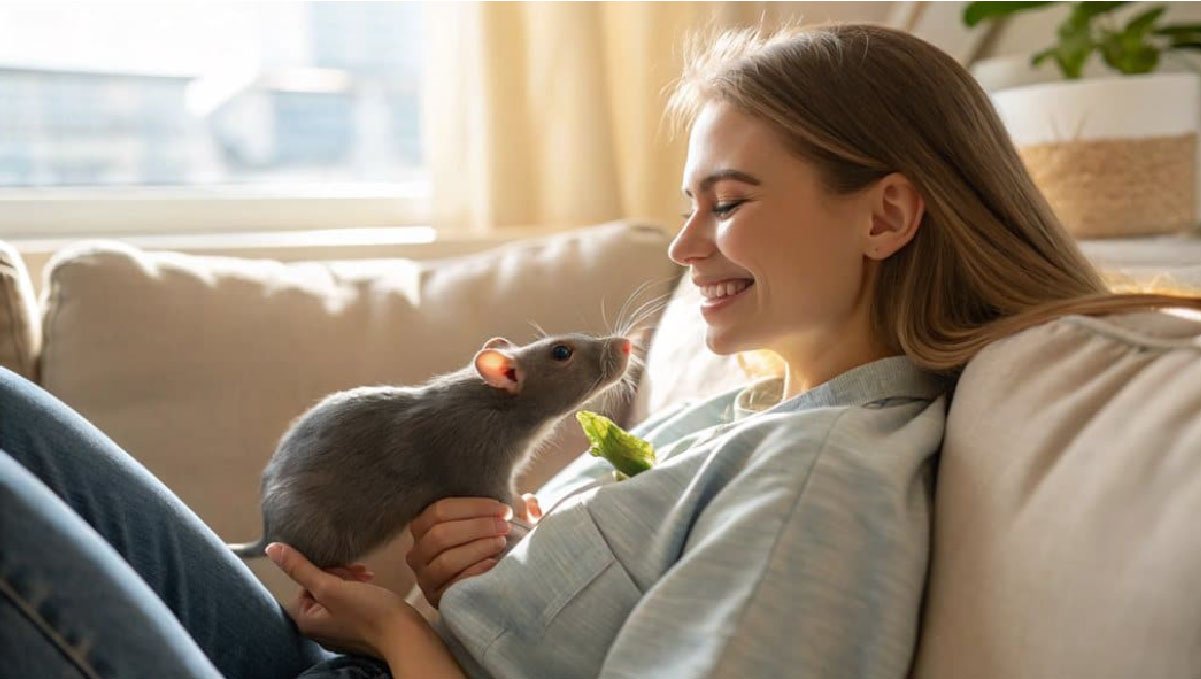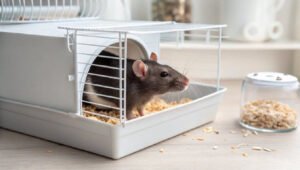Pets
6 Reasons Why Rats Make Good Pets

Rats are ideal pets for compact living spaces due to their minimal space requirements and quiet nature. They exhibit high intelligence and trainability, engaging in playful and interactive behaviors that enhance human connections. These social animals are affectionate companions, fostering strong emotional bonds with their owners, and their presence can have therapeutic benefits, including decreased anxiety and stress. Discovering further insights will reveal more about the unique advantages of rat ownership.
Key Takeaways
- Rats are highly intelligent and trainable, capable of learning tricks and responding to their names.
- They are social and affectionate, forming strong bonds with their owners.
- Compact and suitable for small living spaces, rats are ideal for apartment dwellers.
- Owning rats can offer health benefits like reduced anxiety and improved cardiovascular health.
- They are playful and entertaining, providing dynamic interaction and mental stimulation.
Compact and Apartment-Friendly

With their pocket-sized dimensions, rats are exceptionally well-suited for residents of compact living environments such as apartments.
These small pets require only a minimal footprint for their living quarters. A cage can be conveniently placed in a corner or perched on a shelf, efficiently utilising limited space without causing clutter.
In addition, rats are tranquil creatures, ensuring they do not disturb neighbours or contribute to noise pollution within tight living quarters. This attribute, along with their lack of need for outdoor exercise, underscores their low-maintenance nature.
For individuals dwelling in apartments or other small living spaces, rats offer the unique advantage of pet companionship without larger animals’ spatial and auditory challenges.
Social and Affectionate Companions
Beyond their suitability for small living spaces, rats also excel as social and affectionate companions. As highly social animals, rats require the companionship of their kind to maintain emotional well-being, yet they equally form deep bonds with their human caretakers.
Exhibiting affection through cuddling and playful following, rats actively seek interaction, which is facilitated by their adept use of body language and vocalisations to communicate feelings and desires. This level of interactive companionship is comparable to that of more traditional pets like dogs and cats.
Domesticated rats are particularly gentle, making them excellent companions for families and children who are enthusiastic about engaging closely with pets. Their sociability and safe nature make them ideal for fostering robust, affectionate relationships.
Highly Intelligent and Trainable

Rat intelligence extends beyond simple, instinctual behaviours. These small mammals exhibit remarkable problem-solving skills and adaptability. Highly intelligent and trainable, rats can quickly learn new tasks, making them engaging companions for dedicated owners.
They respond well to training that includes performing tricks, responding to their names, and traversing mazes, showcasing their enthusiasm for learning and cognitive abilities. In addition, studies have demonstrated that rats possess a complex emotional understanding, exhibiting behaviours indicative of empathy and regret.
This emotional acuity and neurological similarities to humans underscore their potential in companionship and scientific research. Using food as a motivational tool enhances the training experience, fostering a bond between the rat and its owner while reinforcing desired behaviours.
Playful and Entertaining
Rats are known for engaging in play activities, including chasing, tussling, and exploring their environment.
These behaviours vary widely among individuals, with younger rats displaying more vigorous play than their adult counterparts.
The ability to learn tricks and respond to commands further enhances the interactive play experience, making rats lively and entertaining pets for people of all ages.
Engaging Play Activities
Exploring the domain of playful activities reveals the dynamic nature of pet rats, which provide entertainment similar to that of more common pets like dogs and cats.
In exhibiting playful behaviours such as chasing and wrestling, rats provide entertaining play that is essential for their mental stimulation and overall health. These activities make rats engaging companions capable of bonding deeply with their owners.
Regular playtime is vital for rats as it prevents boredom and promotes physical exercise, enhancing their well-being. In addition, incorporating toys and puzzles that challenge their problem-solving skills can keep these intelligent creatures both physically active and mentally sharp, reinforcing the benefits of interactive play for rats of all ages.
Varied Play Preferences
While the playful interactions with pet rats are a key aspect of their appeal, it is equally important to recognise their varied play preferences, which cater to their diverse personalities and ages.
Some rats revel in chasing toys, demonstrating their agility and responsiveness, while others might find joy in climbing or engaging in interactive games with their owners.
Younger rats display a heightened playfulness, often mimicking natural behaviours such as tussling and exploring.
Rats also exhibit a penchant for puzzle toys, enhancing their problem-solving skills and providing mental stimulation.
This social playfulness fosters deep bonds with their human caregivers, making each playful interaction an enriching experience that strengthens their connection and contributes to the overall well-being of these intelligent creatures.
Clean and Low Maintenance

Many potential pet owners are surprised to discover that domesticated rats prioritise cleanliness, often dedicating considerable portions of their day to grooming themselves and their cage mates.
These creatures maintain a tidy appearance and prefer clean environments, naturally designating specific areas for waste within their enclosures. This inherent behaviour makes them easier to manage, as they can be effectively litter-trained, considerably reducing mess and controlling odours.
Additionally, their small size requires minimal living space, which is particularly advantageous for apartment dwellers. Unlike many larger pets, rats do not need regular walks or extensive grooming routines, establishing them as a low-maintenance pet choice.
These attributes make rats appealing to those seeking a clean and manageable companion.
Health and Emotional Benefits
Owning pet rats offers notable health and emotional advantages, including reducing anxiety and stress.
These small animals are linked to enhanced immune function, particularly in children, potentially lowering the risk of allergies and bolstering disease resistance.
Additionally, rats’ therapeutic companionship provides significant emotional support, helping to alleviate symptoms in individuals with chronic illnesses.
Reducing Anxiety and Stress
Interacting with pet rats has been scientifically proven to trigger the release of oxytocin, a hormone essential in bonding and stress reduction. This interaction enhances the bond between the owner and the rat and markedly lowers stress levels.
Caring for rats establishes a routine that can mitigate symptoms of anxiety and depression, offering a sense of purpose. Studies indicate that pet owners experience reduced cortisol levels, fostering a more relaxed emotional state.
The playful nature of rats guarantees dynamic companionship, which is vital for alleviating loneliness and bolstering mental health. Regular playful interaction with these pets encourages physical activity, directly linked to enhanced mood and additional anxiety reduction among owners.
Boosting Immune Function
Exposure to diverse microorganisms through pet rats has demonstrated a potential to bolster immune system function in children, considerably lowering the risks of developing allergies and asthma.
Owning these pets has been linked to enhanced immune responses by reducing stress levels and diminishing the production of stress-related hormones such as cortisol. This stress reduction contributes directly to boosting immune function.
Furthermore, the companionship offered by rats helps alleviate loneliness and depression, factors that are essential for maintaining ideal mental health. Improved mental health is closely tied to a more muscular immune system, providing a dual benefit.
Additionally, regular interaction with rats can decrease blood pressure and cholesterol, further supporting immune system health and offering therapeutic benefits.
Therapeutic Companionship Benefits
The therapeutic benefits of pet rats extend beyond physical health enhancements to include significant emotional and psychological advantages.
Rats offer therapeutic companionship that effectively reduces feelings of loneliness and anxiety. This companionship is particularly valuable for individuals grappling with depression or emotional challenges. It has also been observed to decrease blood pressure and cholesterol, aiding cardiovascular health.
Furthermore, the daily care these pets require instils a sense of routine and responsibility in their owners, fostering mental well-being and a sense of purpose. Engaging with rats also enhances empathy and emotional intelligence, especially in children who learn about nurturing through their interactions with these animals.
Additionally, research indicates that pet ownership may improve immune system function and decrease allergy risks in children due to early animal exposure.
For pest control tips and advice, visit our Pest Control Blog today. We cover Romford, Dagenham, Barking, Ilford, and nearby areas.
For More Information Visit Coopermagazine
-

 Celebrity1 year ago
Celebrity1 year agoWho Is Jennifer Rauchet?: All You Need To Know About Pete Hegseth’s Wife
-

 Celebrity1 year ago
Celebrity1 year agoWho Is Mindy Jennings?: All You Need To Know About Ken Jennings Wife
-

 Celebrity1 year ago
Celebrity1 year agoWho Is Enrica Cenzatti?: The Untold Story of Andrea Bocelli’s Ex-Wife
-

 Celebrity1 year ago
Celebrity1 year agoWho Is Klarissa Munz: The Untold Story of Freddie Highmore’s Wife
















